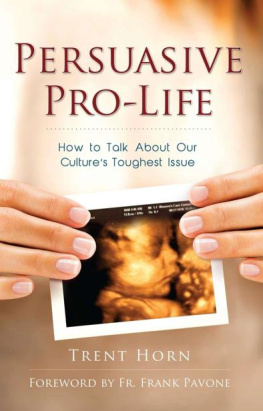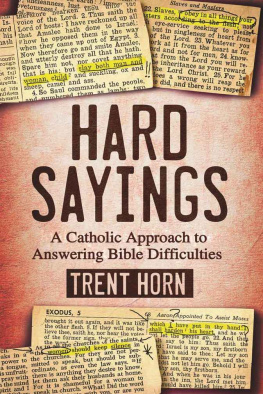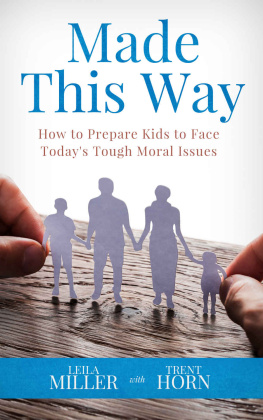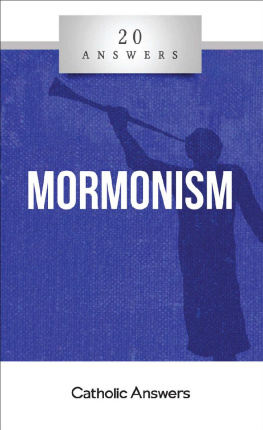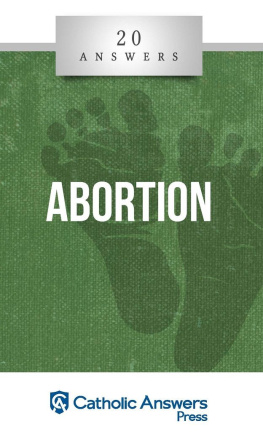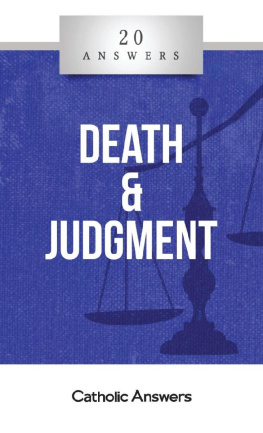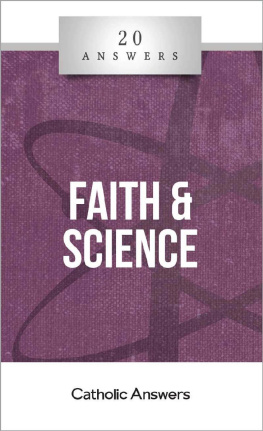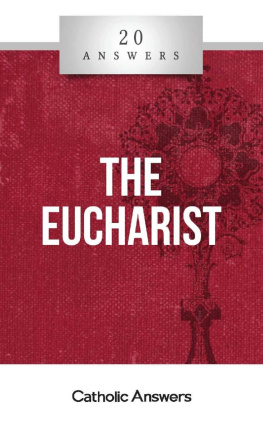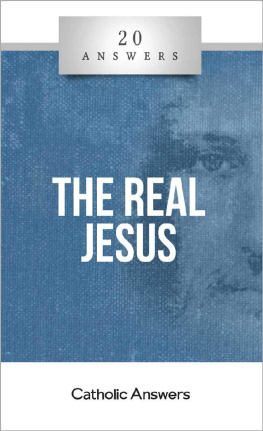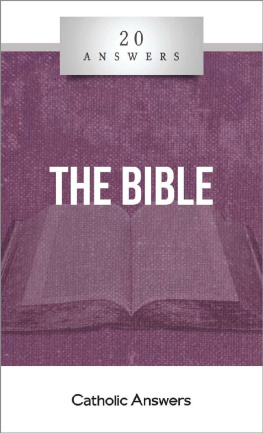Trent Horn - 20 Answers - The Church
Here you can read online Trent Horn - 20 Answers - The Church full text of the book (entire story) in english for free. Download pdf and epub, get meaning, cover and reviews about this ebook. year: 2017, publisher: Catholic Answers Press, genre: Religion. Description of the work, (preface) as well as reviews are available. Best literature library LitArk.com created for fans of good reading and offers a wide selection of genres:
Romance novel
Science fiction
Adventure
Detective
Science
History
Home and family
Prose
Art
Politics
Computer
Non-fiction
Religion
Business
Children
Humor
Choose a favorite category and find really read worthwhile books. Enjoy immersion in the world of imagination, feel the emotions of the characters or learn something new for yourself, make an fascinating discovery.

- Book:20 Answers - The Church
- Author:
- Publisher:Catholic Answers Press
- Genre:
- Year:2017
- Rating:5 / 5
- Favourites:Add to favourites
- Your mark:
- 100
- 1
- 2
- 3
- 4
- 5
20 Answers - The Church: summary, description and annotation
We offer to read an annotation, description, summary or preface (depends on what the author of the book "20 Answers - The Church" wrote himself). If you haven't found the necessary information about the book — write in the comments, we will try to find it.
20 Answers - The Church — read online for free the complete book (whole text) full work
Below is the text of the book, divided by pages. System saving the place of the last page read, allows you to conveniently read the book "20 Answers - The Church" online for free, without having to search again every time where you left off. Put a bookmark, and you can go to the page where you finished reading at any time.
Font size:
Interval:
Bookmark:
20 Answers
The Church
Trent Horn
20 Answers: The Church
Trent Horn
2017 Catholic Answers
All rights reserved. Except for quotations, no part of this book may be reproduced or transmitted in any form or by any means, electronic or mechanical, including photocopying, recording, uploading to the Internet, or by any information storage and retrieval system, without written permission from the publisher.
Published by Catholic Answers, Inc.
2020 Gillespie Way
El Cajon, California 92020
1-888-291-8000 orders
619-387-0042 fax
catholic.com
Printed in the United States of America
978-1-68357-039-4
978-1-68357-040-0 Kindle
978-1-68357-041-7 ePub
Table of Contents
Several years ago, I took part in a pro-life missionary trip with a mixed group of Protestants and Catholics. On Sunday, we split up to attend our respective churches, and the Catholics I was with asked one of the Protestants, whom Ill call Caleb, to join us if he liked.
The town we were visiting had a church affiliated with the denomination Caleb belonged to, but since he didnt know anyone who attended that church, he told us, You know, I think Im probably just going to stay with my host family and read the Bible today, but thanks for offering, guys.
My Catholic friends, who were used to going to church every Sunday unless they were sick, were baffled by this response. They asked Caleb why he thought it was okay to stay home, to which he replied, I mean, church is great for the community and teachings, but the only thing we really need is the Bible.
Its not just certain Protestants who think the Church is not an essential element of the Christian life. According to Georgetown University, one-quarter of Catholics attend Mass only a few times a year (such as Christmas and Easter), and one-third rarely or never attend Catholic services at all. If Caleb and others like him are correct, then this shouldnt bother us, because church attendance is a helpful but nonetheless optional part of the Faith.
But what if this attitude is mistaken? After all, St. Paul spoke of the Church of God not as a helpful accessory; he instead boldly called it the pillar and foundation of truth (1 Tim. 3:15).
In this booklet, we will answer the most common questions people ask about the Church and show how Gods plan to gather his family into one covenant finds its fulfillment in Christs Church.
Church is a translation of the Greek word ekklesia , which means assembly or the called out ones. In the ancient world, ekklesia referred to the practice of calling citizens out of their homes and into a public meeting place. For Christians, the word refers to Gods people, who have been called out of the world for the purpose of being his chosen ones. St. Paul put it this way: [God] chose us in him before the foundation of the world, that we should be holy and blameless before him. He destined us in love to be his sons through Jesus Christ, according to the purpose of his will (Eph. 1:45). In fact, the English word church comes from the German kirche , which means what belongs to the Lord.
The gathering of Gods people into a single assembly began in the Old Testament through the covenants made with Abraham and Moses. As the Catechism of the Catholic Church (CCC) puts it, this remote preparation acted as a sign for the future gathering of people from every nation into Christs kingdom (762). For example, just as the Israelites were a kingdom of priests (Exod. 19:6), all Christians share in Christs priesthood (1 Pet. 2:9). In addition, the ministerial priesthood of the Old Testament has continued through the successors of the apostles, or the bishops, and the priests they appoint. The Catechism puts it this way:
The Lord Jesus endowed his community with a structure that will remain until the kingdom is fully achieved. Before all else there is the choice of the Twelve with Peter as their head. Representing the twelve tribes of Israel, they are the foundation stones of the new Jerusalem. The Twelve and the other disciples share in Christs mission and his power, but also in his lot. By all his actions, Christ prepares and builds his Church (765).
One metaphor for the Church that is found throughout Scripture and helps explain this structure is the body of Christ. Some people think the Church is just a loose collection of believers contained by a minimal set of beliefsin the same way a collection of gifts can be called one because all the gifts are in the same basket. But the Bible teaches that the Church is a single entity (Rom. 12:5) whose members are a part of Christ and one another (1 Cor. 12:27).
The most vivid metaphor that conveys this truth about the Church is that of the body. St. Paul taught the Christians in Ephesus that the husband is the head of the wife as Christ is the head of the Church, his body, and is himself its savior (Eph. 5:23). To the Christians in Corinth he likewise wrote,
For just as the body is one and has many members, and all the members of the body, though many, are one body, so it is with Christ. For by one Spirit we were all baptized into one bodyJews or Greeks, slaves or freeand all were made to drink of one Spirit. For the body does not consist of one member but of many (1 Cor. 12:1214).
In the time of the apostles, believers were called Christians, but the Church itself was not called the Christian Church. It was referred to simply as the Church, as is evident in Lukes description of what Paul and Barnabas did in the city of Antioch, located in modern Turkey. He says, For a whole year they met with the Church, and taught a large company of people; and in Antioch the disciples were for the first time called Christians (Acts 11:26).
Several decades later, St. Ignatius of Antioch penned a letter to Christians who lived six hundred miles away in the coastal city of Smyrna. He said, Wherever the bishop shall appear, there let the multitude [of the people] also be; even as, wherever Jesus Christ is, there is the Catholic Church. The word Catholic comes from the Greek word kataholos , which means according to ( kata ) the whole ( holos ). Christs Church is called the Catholic Church because it is the same Church regardless of the area or time in which it is found, because it contains the fullness of Gods eternal plan of salvation for the human race.
According to Scripture, Christ founded a visible church that has authority to teach and discipline believers and will never go out of existence (Matt. 16:1819; 18:17). St. Paul tells us that this was built on the foundation of the apostles (Eph. 2:20) and would have a hierarchy composed of deacons (1 Tim. 2:813); presbyters, from which we get the English word priest (1 Tim. 5:17); and bishops (1 Tim. 3:17). Paul even instructed one of these bishops, Titus, to appoint priests on the island of Crete (Titus 1:5).
Unlike the apostles, who would eventually die, Christs Church would remain on earth until his Second Coming. In order to accomplish this, the apostles passed their authority to bind and to loose doctrine (see Matt. 18:18), forgive sins (see John 20:23), and speak on behalf of Christ (see Luke 10:16) to their successors. Acts 1:20, for example, records how after Judass death Peter proclaimed that Judass office (or, as the King James Version translates it, his bishopric ) would be transferred to a worthy successor. In 1 Timothy 5:22, Paul warned Timothy to not be hasty in the laying on of hands when Timothy appointed new leaders in the Church.
In A.D. 110, St. Ignatius of Antioch told his readers, Follow the bishop, even as Jesus Christ does the Father, and the presbytery as you would the apostles; and reverence the deacons, as being the institution of God. Let no man do anything connected with the Church without the bishop.
Font size:
Interval:
Bookmark:
Similar books «20 Answers - The Church»
Look at similar books to 20 Answers - The Church. We have selected literature similar in name and meaning in the hope of providing readers with more options to find new, interesting, not yet read works.
Discussion, reviews of the book 20 Answers - The Church and just readers' own opinions. Leave your comments, write what you think about the work, its meaning or the main characters. Specify what exactly you liked and what you didn't like, and why you think so.

